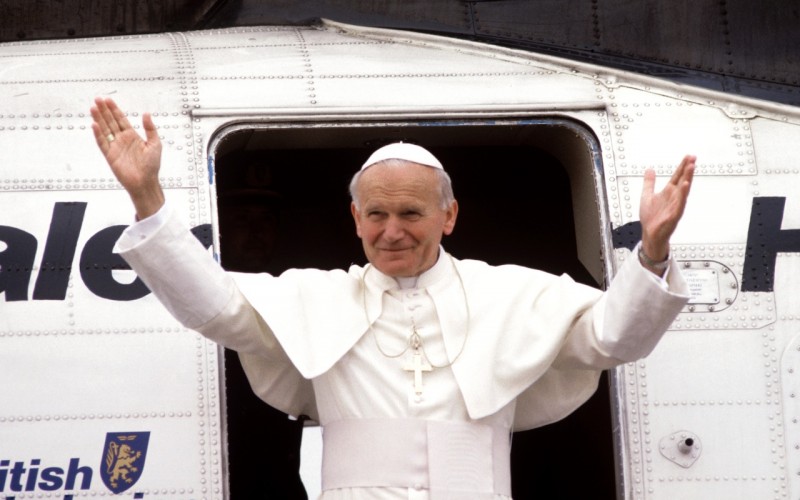St John Paul II’s challenge for the synod
'Do not be afraid of the love that places clear demands on people,' John Paul wrote
Oct 23, 2018

By Fr Raymond de Souza
At the 2015 synod on the family, the assigned Gospel for the opening Sunday Mass was the teaching of Jesus on marriage and divorce, a providential reminder for the synod participants. This past Sunday, in the midst of the synod on youth, at the canonisation of Pope St Paul VI and St Oscar Romero, the assigned Gospel was that of the rich young man. Another bit of lectionary providence.
In his homiletic reflection on the young man’s encounter with Jesus, Pope Francis declared himself on a central issue of the synod. As I put it in the column here last June: challenge or comfort in the pastoral care of youth? Should the full challenge of Christian discipleship be presented to young people, even if it is demanding and perhaps intimidating? Or should a more comforting invitation be issued, lest young people today, like the young man of the Gospel, turn away?
“We cannot respond to Him, who made Himself our servant even going to the cross for us, only by observing some of the commandments,” Pope Francis preached. “We cannot give Him, who offers us eternal life, some odd moment of time. Jesus is not content with a ‘percentage of love’: we cannot love Him 20 or 50 or 60 per cent. It is either all or nothing.”
All or nothing. That is clear enough. Whether the synod takes that on board remains to be seen.
Another relevant papal reflection on the rich young man comes from St John Paul II, whose 40th anniversary of election (October 16) and feast day (October 22) fall during the synod. In 1985, his apostolic letter to youth was built around that biblical encounter. And while that landmark letter – the Church’s most complete address to young people – was completely ignored in the synod secretariat’s preparatory documents, perhaps the Sunday Gospel might usefully prompt another look.
“[This encounter] has a more universal and timeless character … in a certain sense it remains valid constantly and continually, throughout the centuries and generations,” John Paul wrote. “Christ speaks in this way to a young person, a boy or a girl; His conversation takes place in different parts of the world, in the midst of the different nations, races and cultures.”
There has been plenty of synod talk about shaping the future; less so about the horizon of eternity. John Paul wrote that the rich young man, with his high ideals and holy ambition for eternal life, expressed the desire of the young to live for something more, something great. Indeed, John Paul proposed to them that the very greatest things were at stake.
“So we find ourselves here at a crucial moment, when, at every step, time and eternity meet at a level which is proper to man. It is the level of the conscience [which] is the most important dimension of time and history,” John Paul wrote. “For history is written not only by the events which in a certain sense happen ‘from outside’; it is written first of all ‘from within’: it is the history of human consciences, of moral victories and defeats. Here too the essential greatness of man finds its foundation.”
Young people are drawn to a desire to make the world better, to leave a mark. That desire does not fulfil itself primarily in politics or economics or other social categories. That desire is most deeply met in the moral choices made in the heart of a person before God.
The young person ought not be afraid of the demanding invitation Jesus offers: follow me! The invitation is radical and demanding, but it is preceded by the “loving look” of Jesus, John Paul insists, and is therefore possible.
“Do not be afraid of the love that places clear demands on people,” John Paul wrote. “These demands – as you find them in the constant teaching of the Church – are precisely capable of making your love a true love.”
John Paul there is talking specifically about the vocation to marriage, but the same approach is applied earlier to the other vocations that young people ought to consider. Greatness is at stake; and greatness is possible.
“Jesus is radical,” preached Pope Francis on Sunday, taking up a similar theme. “He gives all and He asks all: He gives a love that is total and asks for an undivided heart.”
The synod deliberations to date have been rightly criticised for adopting too much the perspective of the world upon the youth of today. Instead, the starting point ought to be how Jesus looks upon them, as He looked upon the rich young man. Pope Francis said as much on Sunday. If the synod accepts that approach, it would do well to revisit St John Paul’s profound treatment of the same biblical encounter.
Fr Raymond J de Souza is a priest of the Archdiocese of Kingston, Ontario, and editor-in-chief of convivium.ca
(This article first appeared in the October 19 2018 issue of the Catholic Herald)







Total Comments:0